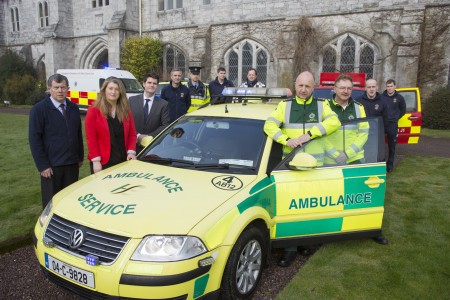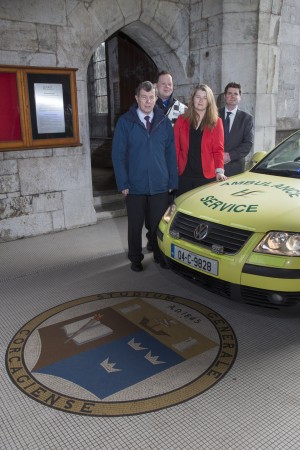26 October 2016
By Bryan T. Smyth
bryan@TheCork.ie

Peter Daly Chief Emergency Management Officer â?? South, Dr. Karen Neville, S-HELP Coordinator, Dr. Andrew Pope, WP Co Lead and members from the Emergency Services. Photo by Tomas Tyner, UCC.
Emergency responders from both sides of the Irish border will gather today in Dublin for a simulated chemical explosion scenario, to test a Decision Support (DS) Tool-set designed to reduce the impact of large-scale disasters on public health.
The online decision support system has been developed by S-HELP (Securing Health, Emergency, Learning and Planning), a €3.5 million EU-funded research and development project led by Business Information Systems (BIS), Cork University Business School (CUBS) in University College Cork (UCC). Dr Karen Neville is the coordinator of the project, and the development of the tool-set is led by Dr Andrew Pope and Dr Simon Woodworth, all staff in BIS, CUBS.
Today’s exercise will be held in the National Emergency Coordination Centre (NECC) and will feature emergency management decision makers, first responders, and planners from fire and rescue services, public health and inter-agency management offices from across the borders. The Inter-Agency Emergency Management Office (IAEMO), Health Service Executive (HSE), and the Public Health Authority (PHA) are organising the scenario to test the tools coordinated by UCC.
Speaking about today’s exercise, Dr Karen Neville, S-HELP coordinator said “Large-scale disasters, whether natural or manmade, require immediate response under time pressure; rapid decision-making; appropriate allocation of resources; prioritising casualties and casualty evacuation; administering first-aid; dealing with human and psychological stress; and efforts to limit the level of devastation. All of this becomes more complicated in the case of cross-border catastrophes.

eter Daly Chief Emergency Management Officer â?? South, John M. Sheehan, Inter-Agency Emergency Management Officer, Dr. Karen Neville, S-HELP Coordinator and Dr. Andrew Pope, WP Co Lead. Photo by Tomas Tyner, UCC.
“Regular and consistent training coupled with joint exercises, like the simulated explosion today, are key to good emergency management. The use of real-world emergency scenarios and a dynamic DS tool-set is the best way to train people who may be involved in responding to an emergency.”
S-HELP is a three-year project that concludes in January 2017. It is a joint venture between nine organisations from across Europe, including four Irish partners – Future Analytics Consulting Ltd; UCC-BIS; the HSE; and the ASSERT Centre, UCC.
The exercise is the second of three such events. The first was a simulated pandemic which took place in Tel Aviv in September; and the final exercise will be a flooding scenario to be held in Cork in November.
See www.fp7-shelp.eu or follow @fp7shelp on Twitter to find out more about the project.

